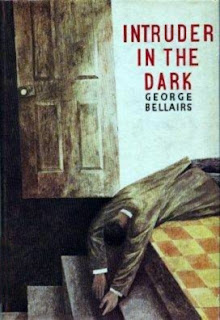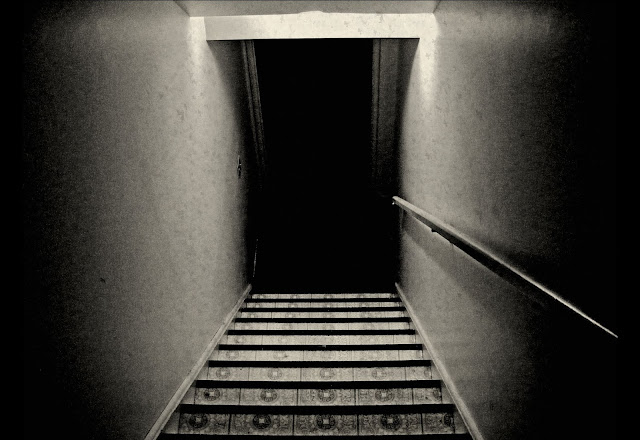Undoubtedly cosmic convergence
has conspired to bring Doc Martin into my life simultaneously with
the advent of my first Chief
Superintendent Littlejohn crime
novel. Of course I cannot rule out the powerfully psychic influences
of Yvette and Donna. Yvette, a fellow book blogger, has been gently
urging me for months to give the Littlejohns a try;
Donna, my morning walking buddy, described some characters and
situations that amused her on the BBC's Doc
Martin series, which I
found in our public library's DVD section. It hadn't occurred to me
when I started both at about the same time that the genius of the
show and the novels is
their intriguingly, hilariously unforgettably nasty characters.
My
favorite of the bunch in Intruder
in the Dark is the
murder victim –stupid,
raging, cowardly bank clerk
Cyril Savage. He's the sort
of jerk you egg on
when he starts kicking open the locked cellar door you'd yell NO! NO!
DO NOT OPEN
THAT DOOR!! were it someone else--almost anyone less obnoxious--about
to enter the cellar where you know evil lurks. With Savage I found
myself shouting YEAH, YOU STUPID FOOL, KICK IT OPEN! GET WHAT'S
COMING TO YOU!! (I was so loud I expect my landlady will have words
with me tomorrow when I pay the rent. At least none of the neighbors
called 911.) My laughter when Savage got what was coming to him was
almost as loud, and quite fiendish, and the only reason I wanted Chief
Superintendent Littlejohn to crack the case was my hope someone would
pin a medal on the murderer.
I
should note it wasn't me who labeled Cyril Savage a "cowardly
bank clerk," altho I have no deep affection for bankers as a
predatory species. The culprit who created Savage—George Bellairs,
aka Harold Blundell--was himself a banker, and evidently knew whereof
he wrote about the do-I-knooow-you?
type.
Despite
his being a banker, one may assume Bellairs/Blundell considered
himself a manly man, as he treats Vicar Luttrell (a very minor
character, thankfully) with the contempt the stereotypically manly
man enjoys dumping on the stereotypically less masculine of his
gender, by dismissing him as having "a round fruity voice."
Then again, B/B might simply have disliked clerics, or at least this
one, altho the round-fruity-voiced Luttrell has little more than a
walk-on/walk-off role, perhaps just enuf exposure to give us a laugh
at his round fruity voice (the late Truman Capote did come to mind).
Other
characters. Oh, my goodness, as Vicar Luttrell might have said with a
flap of a hand, they're all so deliciously despicable. I've no choice
but to narrow them down. Let's start with P.C. Green, the slow-witted
local constable--"a good humdrum bobby"--who's
trying to impress Littlejohn and his Scotland Yard partner, Inspector
Cromwell, with his competence:
"Green
opened a drawer in the desk and took out a large black notebook,
which he opened and placed before him. He’d been expecting this,
had got all his points in what he considered to be order, and even
rehearsed it with his wife. And at the end of the recital Mrs. Green
had solved the case and
suggested the arrest of Mrs. Savage, who, she said, had obviously
done it!" Fortunately the constable's shrewish
wife, "the powerhouse of the outfit...small and fair and given
to fixed ideas which she relentlessly pursued," was
wrong, or we would not have had the pleasure of meeting the other
nutjobs in Plumpton Bois, where murder was as rare a phenomenon as
sanity.
I
don't mean to dismiss
Green's wife as a suspect, however,
as her ambition is
a driving force. "You
want to end up at least as an inspector," she
shrills at her husband.
"Myself, I’m not content to finish up in Plumpton. Besides,
we’ve the children to think about..." Aha!
One hopes the Yard boys keep an eye on that one.
The
standard Igor type makes a cameo appearance as Hank, the handy-man,
"who filled the posts of hall-porter, barman, taproom waiter and
chucker-out. He looked like a retired punch-drunk boxer." His
boss, the lazy no-account owner of Miner's
Arms,
the inn (the only inn) where Littlejohn and Cromwell stay during the
duration of their investigation, and the boss's shrewd wife, are
early suspects, and one can never quite rule them out, because they
aren't quite suspicious enuf to be innocent. I'll leave it there.
There's
Mr. Hubbard, chairman of the local ruling council, a "cocky
little shrivelled-up old man with the facial tic" who once
romanced Melody Johnson, who'd bequeathed on her death the old
Johnson mansion to the horrible Cyril Savage her only known livng
relative (her
bastard son, who
was believed to have been killed in WWII, was presumed to be carrying
Mr. Hubbard's DNA, but Hubbard had left her at the altar, so the
gossip said, and technically wouldn't have qualified for any
inheritance, etc. etc.)
Perhaps
my next
favorite
unlikable character is Mrs. Murphy, who ran "The Stores," a
general store that had handled the town's mail before a real post
office took over, leaving Mrs. Murphy still the store owner and a
confirmed busybody, but bitterer and bossier than ever. You know she
couldn't be the murderer, which means she just might have been the
one who brought the raging, pusillanimous banker to his well-deserved
doom.
But
oh mercy,
no way I can leave out "Old Cunliffe," Melody Johnson's
lawyer. who seems to have inherited the piddling cash left in her
estate. She'd fallen on hard times, and her only property was the old
house her father had built above his now long-defunct
lead mine. Some townspeople believed she'd stashed a bundle of cash
in the basement (are we catching on a tad here?) "Old Cunliffe
was probably her only remaining friend from the old days," the
local physician tells Littlejohn. "He did a lot for her during
her lifetime and, as she had nobody else to leave it to, she passed
her cash on that way. It’s also well known that Cunliffe is very
hot on the money and makes a habit of reminding clients when they
make their wills that it’s customary to leave what he calls a small
memento to the lawyer. His wife is a very extravagant woman
and
he’ll need every halfpenny he can come by to make ends meet."
Too
suspicious, no? I mean, the guy had motive and means (a key to the
house) and, altho he was another old coot, might have been strong
enuf to whack the cowardly banker over the head with a crowbar under
the circumstances, we know in these crime mysteries it's NEVER the
obvious suspect who dunnit. And yet...
 |
| Bellairs/Blundell modeling hip new haircut |
There
are more suspects and nutty characters, and some great dialogue and
words, such as Constable Green's wife having..."titivated him up
a bit" before he left home for the office (it's British, you'll
have to use your imagination).
The
only characters not leaving much impression are, oddly, Littlejohn
and Cromwell. We're told Cromwell dresses like a dandy, but we don't
have clue as to how Littlejon dresses or if he wears any clothes at
all. We get no idea how he looks or walks or—oh, wait a minute, I
just remembered, in one scene he lights a pipe! But there's no
personality. He's just a voice asking questions. Same with Cromwell.
I can't identify with either of them other than that because I have
no sense of them I can become them. It's a strange experience. If
this was B/B's intention it's daringly original, possibly. Certainly
not elementary.
Then
again, Intruder in
the Dark
came out in 1966, about midway thru the fifty or so Littlejohn
novels. Maybe by then he expected his readers to know the two Yard
men so well reminding wasn't needed. Now I suppose I shall have to
start at the series beginning. I do kind of wonder, for example, if
Chief Superintendent Littlejohn has a first name or wears an
Inverness or perhaps vomits at the sight of blood...oh, wait, that's
Doc Martin.
[For
more Friday's Forgotten Books check the links on Patti
Abbott's unforgettable blog]


Littlejohn's first name is Thomas. :) And you're right, Bellairs didn't spend a great deal of time giving us much about him. We know he's happily married and his wife's name, I think, is something like Etty. Littlejohn is very fond of Cromwell and they work well together. But they are neither of them vivid in their personalities. But that's okay with me because everyone else in these mystery tales is vivid enough. So glad you gave Bellairs a try, Mathew. I'm currently reading CRIME IN LEPER'S HOLLOW - another Littlejohn - and it is SO good.
ReplyDeleteI have The Case of the Seven Whistlers in the batting lineup, Yvette. For next week I'm reading Detective Inspector Huss by Helene Tursten, a Swedish writer recommended by either you or Tracy. I'm finding it a tad slow-going, and it's about twice as long as most cozies, but I'll finish it.
DeleteI wonder if a "fruity" voice at this juncture was akin to a "plummy" voice rather than an effeminate one...but this is probably too much to hope for...
ReplyDeleteI've been wondering about that, too, Todd, altho I'm going to hafta Google plummy.
DeleteThe book was published in 1966. "Fruity" was definitely intended to be a gay insult.
DeleteThese are all interesting comments on the Bellairs books. I have not read any but I am hoping to get some soon. It does seem like mysteries written at that time often focused less on the sleuths and more on the other characters.
ReplyDeleteHis supporting characters are fun to hate, Tracy. The mystery was guessable, but the story held my interest.
DeleteI've read five of his books. The more I read the more I realized he was only creating characters to indulge in his love of mockery and ridicule. You certainly picked up on it in this very late entry (not actually from his midpoint career at all, but #44 out of #58). I really only liked THE DEAD SHALL BE RAISED (1942). It was a real detective novel with a plot that was baffling and engaging. It's a wartime mystery and it dares to break free from the "rules" and detective novel conventions that make it a standout for Bellairs. I pretty much disliked everything else I've read of his. The plots suffer for cliche ideas and trite situations. Some writers succeed in making this kind of ridicule humor entertaining, but with others I see the nastiness hiding beneath the so-called humor. With Bellairs so many people in his books are beneath contempt for him that I began to think he must've been a miserable guy in real life.
ReplyDeleteWell, he was a banker. Thanks for the recommendation,John. I wasn't planning on reading any others, but now I shall check out The Dead Shall Be Raised.
Delete